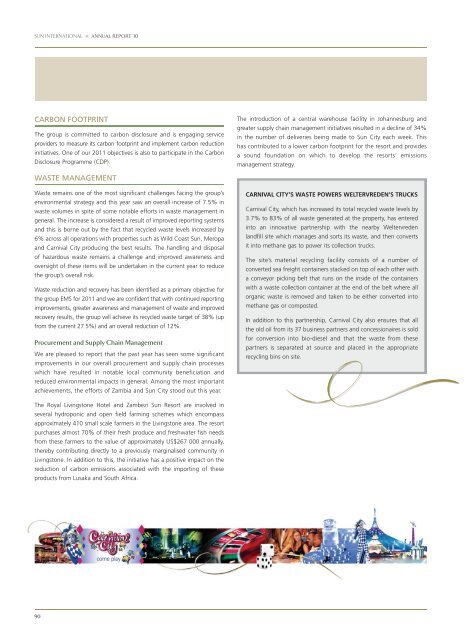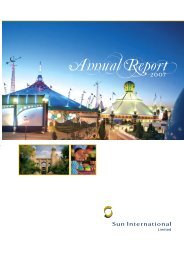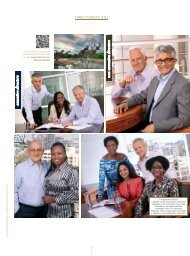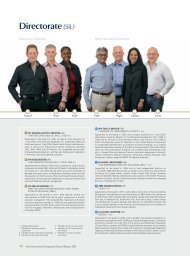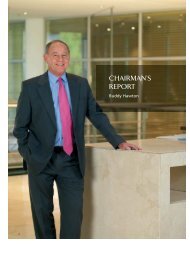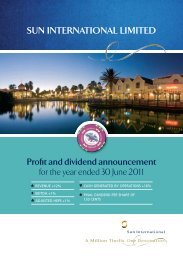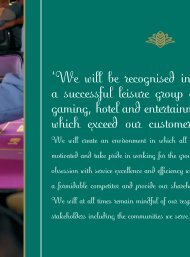PDF 25 MB - Sun International | Investor Centre
PDF 25 MB - Sun International | Investor Centre
PDF 25 MB - Sun International | Investor Centre
Create successful ePaper yourself
Turn your PDF publications into a flip-book with our unique Google optimized e-Paper software.
SUN INTERNATIONAL ANNUAL REPORT ’10<br />
CARBON FOOTPRINT<br />
The group is committed to carbon disclosure and is engaging service<br />
providers to measure its carbon footprint and implement carbon reduction<br />
initiatives. One of our 2011 objectives is also to participate in the Carbon<br />
Disclosure Programme (CDP).<br />
WASTE MANAGEMENT<br />
Waste remains one of the most significant challenges facing the group’s<br />
environmental strategy and this year saw an overall increase of 7.5% in<br />
waste volumes in spite of some notable efforts in waste management in<br />
general. The increase is considered a result of improved reporting systems<br />
and this is borne out by the fact that recycled waste levels increased by<br />
6% across all operations with properties such as Wild Coast <strong>Sun</strong>, Meropa<br />
and Carnival City producing the best results. The handling and disposal<br />
of hazardous waste remains a challenge and improved awareness and<br />
oversight of these items will be undertaken in the current year to reduce<br />
the group’s overall risk.<br />
Waste reduction and recovery has been identified as a primary objective for<br />
the group EMS for 2011 and we are confident that with continued reporting<br />
improvements, greater awareness and management of waste and improved<br />
recovery results, the group will achieve its recycled waste target of 38% (up<br />
from the current 27.5%) and an overall reduction of 12%.<br />
Procurement and Supply Chain Management<br />
We are pleased to report that the past year has seen some significant<br />
improvements in our overall procurement and supply chain processes<br />
which have resulted in notable local community beneficiation and<br />
reduced environmental impacts in general. Among the most important<br />
achievements, the efforts of Zambia and <strong>Sun</strong> City stood out this year.<br />
The Royal Livingstone Hotel and Zambezi <strong>Sun</strong> Resort are involved in<br />
several hydroponic and open field farming schemes which encompass<br />
approximately 410 small scale farmers in the Livingstone area. The resort<br />
purchases almost 70% of their fresh produce and freshwater fish needs<br />
from these farmers to the value of approximately US$267 000 annually,<br />
thereby contributing directly to a previously marginalised community in<br />
Livingstone. In addition to this, the initiative has a positive impact on the<br />
reduction of carbon emissions associated with the importing of these<br />
products from Lusaka and South Africa.<br />
90<br />
The introduction of a central warehouse facility in Johannesburg and<br />
greater supply chain management initiatives resulted in a decline of 34%<br />
in the number of deliveries being made to <strong>Sun</strong> City each week. This<br />
has contributed to a lower carbon footprint for the resort and provides<br />
a sound foundation on which to develop the resorts’ emissions<br />
management strategy.<br />
CARNIVAL CITY’S WASTE POWERS WELTERVREDEN’S TRUCKS<br />
Carnival City, which has increased its total recycled waste levels by<br />
3.7% to 83% of all waste generated at the property, has entered<br />
into an innovative partnership with the nearby Weltervreden<br />
landfill site which manages and sorts its waste, and then converts<br />
it into methane gas to power its collection trucks.<br />
The site’s material recycling facility consists of a number of<br />
converted sea freight containers stacked on top of each other with<br />
a conveyor picking belt that runs on the inside of the containers<br />
with a waste collection container at the end of the belt where all<br />
organic waste is removed and taken to be either converted into<br />
methane gas or composted.<br />
In addition to this partnership, Carnival City also ensures that all<br />
the old oil from its 37 business partners and concessionaires is sold<br />
for conversion into bio-diesel and that the waste from these<br />
partners is separated at source and placed in the appropriate<br />
recycling bins on site.


